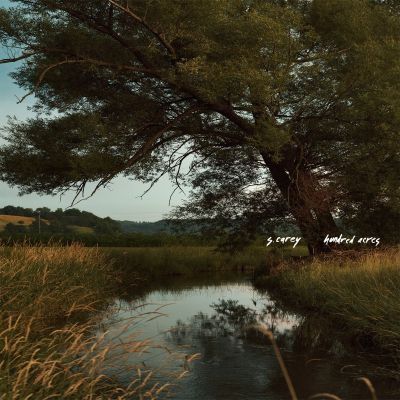"But I don't say too much /
No need to say too much"
These acoustic, autumnal lines are hard to walk, perhaps due to all the leaves on the lyrical ground. For every beauty, a la Bon Iver's For Emma, Forever Ago or Night Beds' Country Sleep, there are hundreds more that lay on the listener's own cutting room floor, full of skippable tracks, forgettable lines and a sleep-inducing pace. Pastoral, in other words, can be a fanciful word for "sleepy as hell."
But when an artist gets it right—and let's be clear that S. Carey has done exactly that with his latest release, Hundred Acres—the finished work is immediately placed upon the shelves of similar classics, crowned for their striking beauty.
Hundred Acres isn't so much a seasonal listen as it is an album that creates its own season. To enter in is to be enveloped in its tone, its gait, its beauty.
From the layered harmonies and perfect guitar tones on "Rose Petals" to the lovely, languid closer "Meadow Song," Hundred Acres never strays from that fine line, as Carey somehow commands your attention with such sparse instrumentation and intimate compositions. It is a masterful display.
To mention a song as a highlight discredits the rest, but we'd be remiss not to single out stunning songs like "Emery" or "More I See." The former allows a rare percussive burst to drive it forward in key stretches, balanced by strings as the beat falls away. Yet the song never stops driving and just when it could afford another victory lap—in fact, you almost yearn for it—it gives way to the plaintive title track that begins the album's second half. Carey is right; he doesn't need to say too much.
The latter, "More I See," is the album's second single and for good reason. The active acoustic center is surrounded by an ideal atmospheric blend of synth layers, a hopeful piano and an eventual drum build. Carey's falsetto is given room to shine, and the entire affair feels like an emotional closing credit. The thematic feel of Hundred Acres actually makes several songs feel that way, as if there are plenty of accompanying visuals lying around somewhere.
Sean Carey has never disappointed since he released All We Grow in 2010, but he's also never reached such a musical promised land. Hundred Acres isn't so much a seasonal listen as it is an album that creates its own season. To enter in is to be enveloped in its tone, its gait, its beauty. Carey's musical vision here is truly something to behold.


